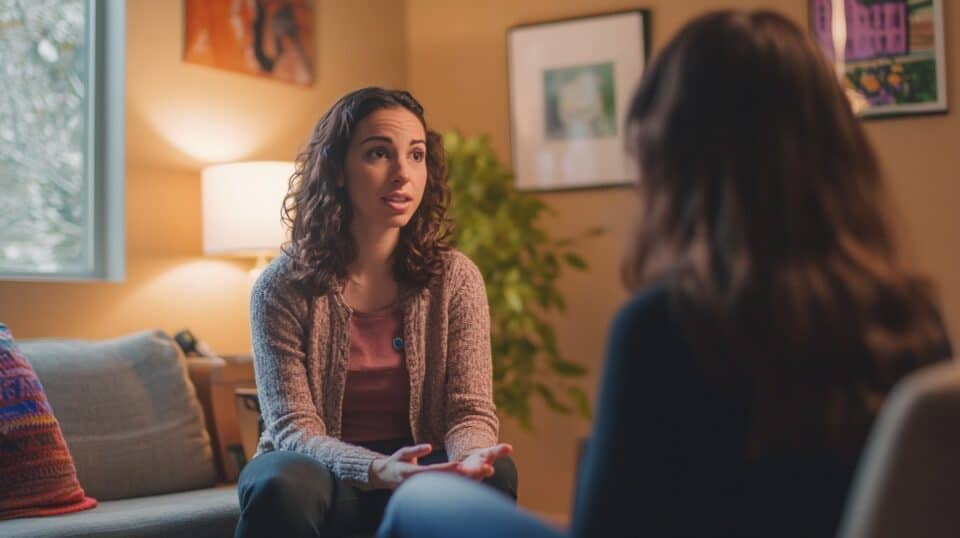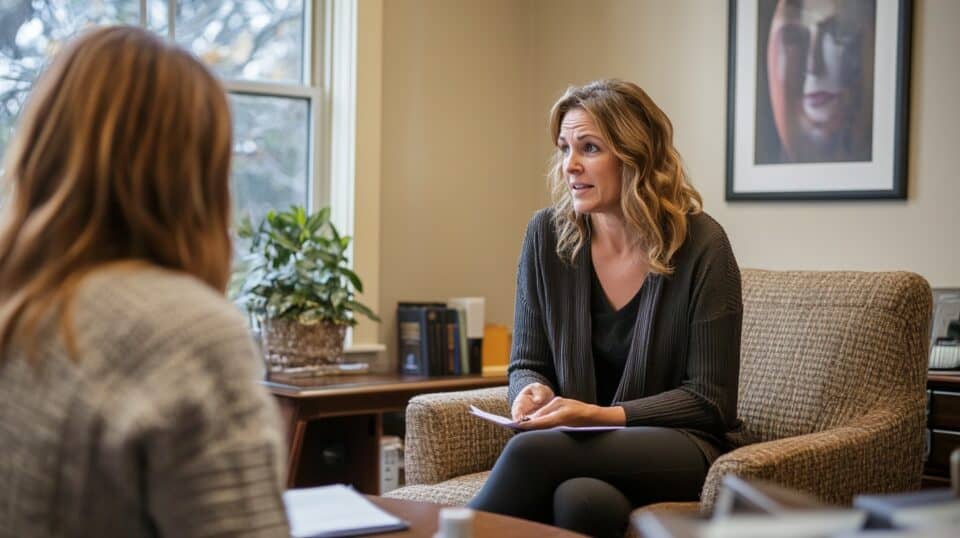Ever felt drawn to helping others with their mental health struggles? You’re not alone. Licensed Mental Health Counselors play a crucial role in supporting people’s well-being. This guide will walk you through the eight key steps to becoming a licensed pro in this field.
Ready to make a difference in people’s lives? Let’s go! 1 2 3
Key Takeaways
Becoming a licensed mental health counselor takes 7-9 years, including a bachelor’s degree (4 years), master’s degree (2-3 years), and supervised clinical work (about 2 years).
You need 2,000-3,000 supervised clinical hours and must pass the National Counselor Examination (NCE), which has 200 questions.
The job market for mental health counselors is growing, with an average yearly salary of $78,000. Counselors can work in various settings like hospitals, schools, or private practice.
Mental health counselors focus on day-to-day issues and short-term goals, while therapists often deal with more complex conditions and may explore a person’s past.
Specialized certifications can boost your career, opening doors to better jobs and higher pay in areas like trauma counseling or addiction treatment.
Table of Contents
Steps to Becoming a Licensed Mental Health Counselor

Ready to help others and make a real difference? Becoming a licensed mental health counselor is a rewarding path. Let’s dive into the steps you’ll need to take to turn this dream into reality.
Earn Your Bachelor’s Degree in Psychology or a Related Field
Starting your journey to becoming a mental health counselor begins with a solid foundation. You’ll need to earn a bachelor’s degree in psychology or a related field. This step typically takes about four years. 1 Don’t worry if you’re not sure which major to pick – psychology, sociology, or human services are all great options. These programs will give you the basics you need to understand human behavior and social interactions.
During your undergrad years, you’ll dive into fascinating topics like human development, research methods, and social psychology. It’s like getting a backstage pass to the human mind! If you’re eyeing a specific grad school, check their requirements.
Some may want extra classes if your degree isn’t in psychology. 2 But don’t stress – with determination and hard work, you’ll be on your way to making a difference in people’s lives.
The journey of a thousand miles begins with one step. – Lao Tzu
Complete a Master’s Degree in Counseling or Psychology
After getting your bachelor’s degree, it’s time to level up! A master’s in counseling or psychology is your next big step. This program usually takes 2-3 years to finish. 3 Most folks go for a Master of Science in Counseling Psychology.
It’s not just about hitting the books, though. You’ll need to do internships and practicums too. These hands-on experiences are super important. They let you practice what you’ve learned in real-life situations.
Your coursework will vary depending on where you live. Each state has its own rules about what you need to study. 1 But don’t worry – your school will guide you through it all.
You’ll learn about different therapy methods, how to diagnose mental health issues and ways to help people cope with life’s challenges. It’s tough work, but so rewarding! By the end, you’ll be ready to make a real difference in people’s lives.
Fulfilling Clinical Experience Requirements

Ready to roll up your sleeves and get hands-on? Clinical experience is where the rubber meets the road in mental health counseling. It’s your chance to put theory into practice – and boy, is it eye-opening!
Accumulate Supervised Clinical Hours
Logging supervised clinical hours is crucial in your journey to become a mental health counselor. You’ll need to record between 2,000 and 3,000 hours, based on your state’s requirements. 4 It’s similar to learning to drive – you need practice before you’re on your own. You’ll work with actual clients under the guidance of an experienced professional. 5 Every two weeks, you’ll have an hour-long discussion with your supervisor about your cases and to improve your skills.
This practical experience is where theory meets practice. You’ll use what you studied in school in real-life scenarios. It can be challenging, but it’s incredibly fulfilling. Your work might be in hospitals, clinics, or community centers.
Each day offers new challenges and opportunities to assist people. Keep in mind, there’s a deadline to complete these hours – so stay focused and make the best of this learning experience!
The Licensing Process

The licensing process is a big step in your counseling journey. It’s where you prove you’ve got the chops to help others. You’ll need to pass a tough exam and jump through some state hoops… but don’t worry! There’s more to learn about this exciting phase – keep reading!
Pass the National Counselor Examination (NCE)
Ready to tackle the NCE? This big test is a key step to becoming a licensed counselor. It’s got 200 questions, but only 160 count. 7 You’ll have 4 hours to finish – that’s plenty of time! Most folks need between 90 to 110 right answers to pass. 6 Don’t sweat it too much, though. With good prep, you’ve got this!
The NCE isn’t just a test – it’s your ticket to helping others.
Passing the NCE opens doors in the mental health field. It shows you’ve got the smarts and skills to help people. After this, you’ll be one step closer to getting your state license.
Let’s look at how to submit your application next.
Submit Your Application for State Licensure
After acing the NCE, you’re ready to tackle the next big step – submitting your state licensure application. This part’s a bit like filling out a job application, but with higher stakes.
You’ll need to gather all your docs – transcripts, proof of clinical hours, and that shiny new NCE score. Don’t forget to triple-check everything before sending it off! 8
Now, let’s talk money. The whole process will set you back $180 – that’s $100 for the application fee, $75 for initial licensure, and a $5 unlicensed activity fee. It might seem steep, but think of it as an investment in your future career.
Once you’ve dotted all the i’s and crossed all the t’s, send it in and pat yourself on the back. You’re one step closer to becoming a licensed mental health counselor! 9
Opportunities for Further Certification

Want to level up your counseling game? There’s a world of extra certs waiting for you! These can boost your skills and make you stand out in the field. Ready to dive in?
Obtain Specialized Certifications in Mental Health Counseling
Specialized certifications can boost your career as a mental health counselor. They show you’re an expert in specific areas. For example, you might get certified in trauma counseling or addiction treatment.
These certs often need extra training and passing a challenging exam. But don’t sweat it – it’s worth it! 10
Specialization is the key to standing out in a crowded field.
Getting certified can open doors to better jobs and higher pay. It’s like leveling up in a video game… but for your career! Plus, you’ll gain skills to help more people. That’s a win-win in my book.
Just keep in mind, each certification has its own rules, so do your research before you start. 5
The Role and Expertise of a Licensed Mental Health Counselor

Licensed mental health counselors wear many hats. They’re not just listeners – they’re problem-solvers, guides, and cheerleaders rolled into one.
Explore the Responsibilities of a Mental Health Counselor
Mental health counselors wear many hats. They’re the listening ear, the guiding hand, and the voice of reason for folks dealing with life’s ups and downs. These pros help people tackle tough stuff like addictions, family drama, and feeling down in the dumps.
They’re not just sitting in an office all day, either. You might find them in schools, jails, hospitals, or community centers – wherever people need a helping hand. 11
I’ve seen firsthand how these counselors make a real difference. They’re like detectives, piecing together clues from a person’s past and present to help them move forward. They teach coping skills, offer a safe space to vent, and sometimes even step in during crises.
It’s not all talk therapy, though. These counselors often team up with doctors, social workers, and other health pros to give their clients the best shot at feeling better. It’s a job that takes heart, smarts, and a whole lot of patience. 5
Discover Essential Skills for Effective Counseling
Great counselors have a range of skills. They listen well and show they care. They help folks solve problems and set goals. Being a good listener means more than just hearing words – it’s about picking up on feelings and body language too. 13 Counselors need to be patient and kind, making people feel safe to open up.
Problem-solving is another key skill. Counselors help clients break big issues into smaller, manageable parts. They guide people to find their own answers, not just give advice. Goal-setting keeps therapy on track, giving clients something to work towards.
Good counselors check in often to see how things are going, adjusting the plan if needed. These skills help counselors make a real difference in people’s lives. 12
Career Paths and Advancement in Mental Health Counseling

Ready to shake things up in your mental health counseling career? Buckle up! There’s a whole world of exciting paths waiting for you – from private practice to specialized roles in schools or hospitals.
Plus, with the right moves, you could climb the ladder to supervisory or leadership positions… talk about a career glow-up!
Explore the Job Market for Mental Health Counselors
The job market for mental health counselors is booming! With an average yearly pay of $78,000, this field offers great chances for women to make a difference and earn well. 14 You’ll find jobs in many places – from federal and state agencies to private practices.
Some counselors work in crisis centers, while others help couples and families. The best part? You can choose what fits you best.
Want to help vets deal with trauma? Or maybe guide teens through tough times? There’s a spot for you. The field is growing fast, so now’s a great time to jump in. Plus, you can work in different settings, such as hospitals, schools, or even your own office. It’s not just a job – it’s a chance to change lives and grow your career at the same time. 15
Identify Career Advancement Opportunities and Specializations
Mental health counselors have tons of ways to grow their careers. You can climb the ladder in hospitals, schools, or even start your own practice. 14 It’s like a buffet of options! Some folks choose to focus on specific areas like addiction or family therapy.
Others might go for leadership roles, managing teams of counselors. The sky’s the limit!
Want to stand out? Grab some extra certifications. They’re like gold stars on your resume. You could become an expert in trauma therapy or specialize in helping veterans. 16 These skills can open doors to higher-paying jobs and more challenging work.
Plus, you’ll be able to help even more people… and isn’t that why we got into this field in the first place?
Answers to Common Questions on Becoming a Licensed Mental Health Counselor

Got questions about becoming a licensed mental health counselor? You’re not alone! Let’s tackle some common head-scratchers… like how long it takes to get that shiny license and what sets counselors apart from therapists.
Buckle up, ladies – we’re about to clear the fog!
Estimate the Time to Obtain Licensure
Becoming a licensed mental health counselor takes time – but it’s worth it! On average, you’re looking at 7 to 9 years from start to finish. Here’s the breakdown: 4 years for your bachelor’s degree, 2 to 3 years for your master’s, and about 2 years of supervised clinical work. 1 It might seem like a long haul, but think of it as building your superhero toolkit… one skill at a time!
Don’t let the timeline scare you off, though. Those years fly by faster than you’d think! You’ll be learning cool stuff, helping people, and growing as a person. Plus, each step brings you closer to your dream job. 17 Before you know it, you’ll be rocking that counselor title and making a real difference in people’s lives.
Differentiate Between a Mental Health Counselor and a Therapist
Now that we’ve talked about how long it takes to get licensed, let’s clear up a common mix-up. Mental health counselors and therapists might sound the same, but they’re not quite twins.
Mental health counselors focus on helping folks with day-to-day issues. They’re like your go-to pals for stress, relationship hiccups, or when life throws you a curveball. 18 Therapists, on the other hand, often go deeper.
They might deal with more intricate mental health conditions and use different treatment methods.
Both pros aim to boost your mental well-being, but their approach can differ. Counselors usually work on short-term goals and practical solutions. Therapists might take a longer view, exploring your past to understand your present.
It’s like choosing between a quick fix and a full makeover – both have their place, depending on what you need. Whether you pick a counselor or therapist, you’re taking a great step towards better mental health! 19
People Also Ask
What education do I need to become a licensed mental health counselor?
You’ll need a bachelor’s degree first. Then, get a master’s in clinical mental health counseling. Make sure it’s from a program approved by the Council for Accreditation of Counseling and Related Educational Programs (CACREP). This path sets you up for success.
Are there exams I need to pass for licensure?
Absolutely! You’ll face the National Counselor Examination (NCE) or the National Clinical Mental Health Counseling Examination (NCMHCE). These tests are tough cookies, but they’re your ticket to becoming licensed. Study hard and you’ll crack them!
How much supervised clinical experience is required?
Most states want you to clock in 2,000 to 4,000 hours of supervised clinical experience. It’s like an apprenticeship for your brain! You’ll work with real clients under a seasoned pro’s watchful eye. This hands-on training is gold for your career.
Can I specialize in areas like school counseling or grief therapy?
You bet! After getting your license, you can focus on areas like school psychology, grief counseling, or working with folks battling depression. It’s like picking your flavor of ice cream – there’s something for everyone in this field!
What personal qualities are important for a mental health counselor?
You’ve got to have top-notch people skills. Being a good listener is key. Empathy is your secret weapon. You should be patient, kind, and able to keep cool under pressure. It’s like being a superhero, but instead of a cape, you wear compassion!
How does licensure differ between states?
Each state has its own recipe for licensure. Some might ask for more supervised hours, others might want extra exams. It’s like a patchwork quilt of rules! Always check with your state’s board of mental health professionals to get the scoop on local requirements.
References
^ https://bouve.northeastern.edu/news/how-to-become-a-licensed-mental-health-counselor-lmhc/ (2023-05-28)
^ https://www.psychology.org/careers/counseling/
^ https://auafs.com/careers/health/steps-to-become-a-mental-health-counselor.html (2023-11-22)
^ https://www.counseling.org/resources/licensure-requirements/clinical-experience
^ https://www.tealhq.com/how-to-become/mental-health-counselor
^ https://www.youtube.com/watch?v=HEQt8QIZLA8
^ https://www.bbs.ca.gov/pdf/forms/lpc/lpc_app_oos_01012016.pdf
^ https://floridasmentalhealthprofessions.gov/licensing/licensed-mental-health-counselor/
^ https://www.counselingpsychology.org/counseling/careers/mental-health-counselor/
^ https://bouve.northeastern.edu/news/what-do-mental-health-counselors-do-role-responsibilities/ (2023-05-28)
^ https://positivepsychology.com/counseling-skills/ (2021-09-17)
^ https://www.indeed.com/career-advice/finding-a-job/counselor-skills-to-develop (2024-06-28)
^ https://psychologyjobs.com/career-advice/mental-health-therapist-careers/ (2024-04-30)
^ https://www.indeed.com/career-advice/career-development/how-to-become-a-mental-health-counselor (2024-06-28)
^ https://socialworklicensemap.com/social-work-resources/become-mental-health-counselor/
^ https://bouve.northeastern.edu/news/how-long-does-it-take-to-become-a-licensed-mental-health-counselor/ (2023-05-28)
^ https://www.onetonline.org/link/summary/21-1014.00
^ https://bouve.northeastern.edu/news/counselors-vs-therapists-vs-psychologists-key-differences/ (2023-05-28)



